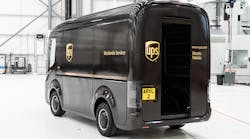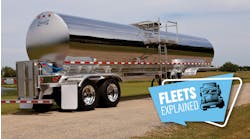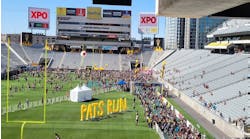UPS is investing in electric vehicle maker Arrival and buying 10,000 of its EVs to add to the UPS fleet in North America and Europe.
Arrival makes electric vehicle platforms and purpose-built EVs that the company says offer a financial value compared to both traditional internal combustion engines and existing EVs. The carrier’s venture capital arm, UPS Ventures, made the minority investment in Arrival.
The 10,000 EVs from Arrival, which would roll out over the next four years, would add to the already largest for-hire fleet. And UPS has “priority access” to purchase more purpose-built electric vehicles from Arrival, which is based in London.
UPS and Arrival plan to work together to develop EVs with advanced driver-assistance systems (ADAS). Along with the technology increasing safety and operating efficiencies, UPS is looking at the potential of automated movements by these EVs at UPS depots. The carrier plans to start testing ADAS features later this year.
Future UPS vehicle purchases from Arrival will be dependent on successful tests. But if successful, another 10,000 Arrival vehicles could be purchased later this decade. And as an investor in the EV-maker, UPS has the option to fast-track future orders.
Arrival has three small production facilities in the UK and one in New Jersey here in the U.S. Neither company disclosed the vehicle prices.
UPS rivals FedEx and Amazon have also been focusing on adding EVs to their fleets as the race for last-mile delivery in urban centers grows. Amazon plans to add up to 100,000 Rivian battery-electric delivery vans starting in 2021. FedEx and Ryder Systems teamed up over a year ago to add Chanje EVs to FedEx’s California fleet.
Arrival is the first OEM to provide custom-built delivery EVs for UPS — with a production strategy for global scale. Since 2016, UPS and Arrival have worked together to develop delivery vehicles concepts. The companies previously said they would develop a state-of-the-art pilot fleet of 35 electric delivery vehicles for pilot testing in London and Paris. The carrier is also pioneering new approach to electric charging and storage that has now been deployed in UPS’s central London facility.
“UPS continues to build an integrated fleet of electric vehicles, combined with innovative, large-scale fleet charging technology,” said Juan Perez, UPS chief information and engineering officer. “As megatrends like population growth, urban migration, and e-commerce continue to accelerate, we recognize the need to work with partners around the world to solve both road congestion and pollution challenges for our customers and the communities we serve. Electric vehicles form a cornerstone to our sustainable urban delivery strategies. Taking an active investment role in Arrival enables UPS to collaborate on the design and production of the world’s most advanced electric delivery vehicles.”
Arrival produces its own major core vehicle components — chassis, powertrain, body and electronic controls — as part of a modular design with standardized parts, which the company says reduces maintenance and other costs of ownership.
“UPS has been a strong strategic partner of Arrival’s, providing valuable insight into how electric delivery vans are used on the road and, importantly, how they can be completely optimized for drivers,” said Denis Sverdlov, Arrival chief executive. “Together, our teams have been working hard to create bespoke electric vehicles, based on our flexible skateboard platforms that meet the end-to-end needs of UPS from driving, loading/unloading and back-office operations. We are pleased that today’s investment and vehicle order creates even closer ties between our two companies.”
The partnership lines up with UPS’s strategy to deploy “cutting-edge technologies,” according to Carlton Rose, president of UPS Global Fleet Maintenance & Engineering. “These vehicles are the world’s most advanced package delivery vehicles, redefining industry standards for electric, connected and intelligent vehicle solutions.”




